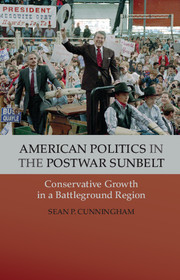Book contents
- Frontmatter
- Dedication
- Contents
- Acknowledgments
- Introduction
- 1 Convergence, Metropolitanization, and Anticommunism
- 2 Race, Rights, and the Liberal Consensus
- 3 Wars against Liberalism
- 4 Southern, Suburban, and Sunbelt Strategies
- 5 Mobilizing the Religious Right in the Politicized “Bible Belt”
- 6 Reagan’s Sunbelt, Reagan’s America
- 7 Shades of Red, Shades of Blue
- Epilogue
- Index
- References
6 - Reagan’s Sunbelt, Reagan’s America
Published online by Cambridge University Press: 05 July 2014
- Frontmatter
- Dedication
- Contents
- Acknowledgments
- Introduction
- 1 Convergence, Metropolitanization, and Anticommunism
- 2 Race, Rights, and the Liberal Consensus
- 3 Wars against Liberalism
- 4 Southern, Suburban, and Sunbelt Strategies
- 5 Mobilizing the Religious Right in the Politicized “Bible Belt”
- 6 Reagan’s Sunbelt, Reagan’s America
- 7 Shades of Red, Shades of Blue
- Epilogue
- Index
- References
Summary
The Sunbelt’s social, cultural, and economic development from the 1940s through the 1970s foreshadowed the region’s emergence as a nationally dominant political force during the 1980s and beyond. From roughly 1945 until the close of the 1970s, the Sunbelt was transformed into an economically vibrant, culturally diverse, and bitterly contested battleground on which many of the most divisive and important political struggles of the postwar era were waged. The Sunbelt’s development also correlated with an important trend in American politics – one in which the nation’s political culture, over time, came to resemble and reflect the Sunbelt’s. Put another way, by the 1980s, the Sunbelt seemed to encapsulate the very essence of American politics, if not American history more broadly – sentimentally patriotic, nostalgic, and dedicated to middle-class expansion on the one hand, divisive, polarized, and passionately contested on the other. These were not necessarily new characteristics in the history of American politics, but so far as the twentieth century was concerned, it was the contested but predominantly conservative nature of the Sunbelt’s development that entrenched these characteristics at the forefront of the nation’s political stage. If the first three decades following the end of World War II were a story about the Sunbelt’s remarkable rise from obscurity (or nonexistence) to prominence and power, then the last two decades of the twentieth century were a story about how the rest of the United States came to see the Sunbelt not as an anomaly, but as a pacesetter and role model.
- Type
- Chapter
- Information
- American Politics in the Postwar SunbeltConservative Growth in a Battleground Region, pp. 191 - 225Publisher: Cambridge University PressPrint publication year: 2014



